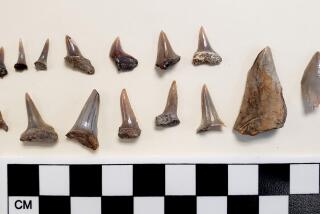Cal State Fullerton Hired to Sort Cache of Bones, Artifacts
- Share via
County supervisors Tuesday approved a three-year contract with Cal State Fullerton anthropologists to sort and catalog hundreds of artifacts and bones that have languished in an overcrowded warehouse.
“This is exciting,” said Karon Kaelin, a university spokeswoman. “We can get started right away, though we need to get a key [to the warehouse]. Then we will put the facility into working order.”
The $350,000 contract calls for scientists to begin systematic documentation of the artifacts and establish a database for fossils found over the years during housing, highway and other construction.
Those artifacts, including million-year-old whale bones and other treasures, have been kept at a warehouse behind barbed wire in Santa Ana. In recent years, the warehouse has suffered water leaks and vandalism to plaster casts.
Supervisor Tom Wilson, whose South County district is undergoing the most development, supported the proposal, which was unanimously passed by supervisors.
“It’s in my district that we’re finding many artifacts. As we develop down there, we should be sharing [those artifacts] with the entire county.”
The county has managed an archeological and historical resources program for about 25 years. But efforts to manage the warehouse itself have been unsuccessful.
The project includes fund-raising to either expand the warehouse, seek another site or use the contract as a springboard to building a museum.
The short-term goal is to put the warehouse into working order, Kaelin said. From there, the team of university scientists will begin the painstaking task of sorting and identifying hundreds if not thousands of bones.
Kaelin said the scientists won’t be working alone, but will create a volunteer program made up from such groups as the Natural History Assn. and Discovery Works Inc., an Irvine archeological and digital design firm that also competed for the county contract.
The contract marks what many believe is a new era in the safekeeping of the county’s important artifacts. According to Cal State Fullerton anthropologists, specimens of whales, dolphins and fish excavated during construction of the San Joaquin Transportation Corridor show that the county is unquestionably one of the richest areas in the world for Miocene marine vertebrate fossils.
The county is equally rich archeologically. Excavations in Newport’s Back Bay have shown that there was a trading industry involving obsidian spear points as far north as the Vancouver area. In addition, repair work at Mission San Juan Capistrano has uncovered extensive evidence of early mission life, including unique metallurgical kilns.
Two university instructors, John D. Cooper and Phyllis Eisentrout, will oversee the project, Kaelin said. They plan to establish guidelines for collection with the possibility of exhibiting specimens to the public in the second year.
“Because we are a university, we have partnerships with K-12 schools and it would be ideal to tie in to that to develop public exhibits,” Kaelin said.
More to Read
Sign up for Essential California
The most important California stories and recommendations in your inbox every morning.
You may occasionally receive promotional content from the Los Angeles Times.













